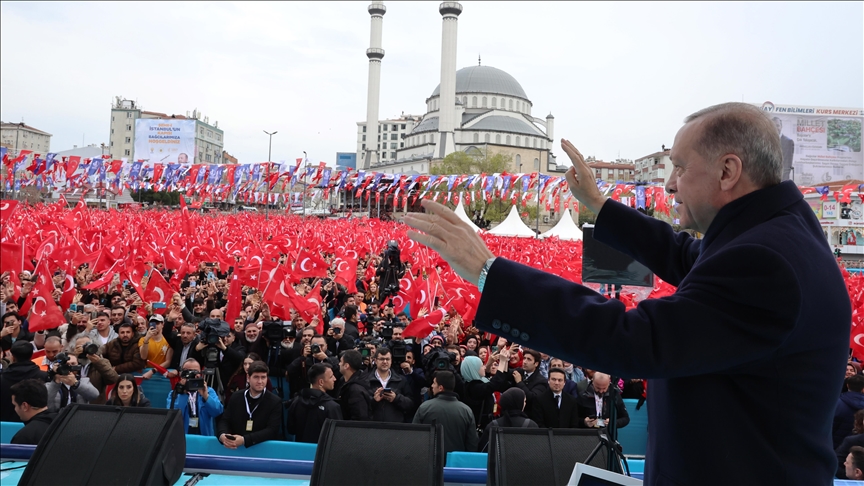

By Anadolu Agency
ISTANBUL
In Türkiye’s critical elections on May 14, four candidates will be vying for the coveted office of president: the incumbent Recep Tayyip Erdogan, Kemal Kilicdaroglu, Muharrem Ince, and Sinan Ogan.
By all assessments, the tight race for power largely hinges on voter sentiments about Türkiye’s economic conditions, the performance of the various fragmented opposition blocs, and the reconstruction efforts after the devastating Feb. 6 earthquakes in the country’s south.
The opposition claims that the economic situation alone will be enough to thwart an Erdogan victory, while the president’s Justice and Development (AK) Party believes that government measures such as significant hikes in the minimum wage and salaries show his determination to tackle economic challenges.
AK Party officials also emphasize that the swift steps taken in the aftermath of the calamitous tremors have handed Erdogan a timely boost in popularity.
‘People looking to Erdogan for solutions’
AK Party officials contend that Türkiye’s economic challenges cannot be viewed independently of the global economic downturn, while also stressing that the earthquakes were a disaster that would test any country in the world.
In Erdogan’s own words, Türkiye will need nearly $104 billion for post-quake recovery efforts.
Despite all the challenges, AK Party members are confident that citizens recognize Erdogan as the right person to address the looming problems.
AK Party polls project a first-round win for Erdogan in the presidential race with a potential tally of 54%, according to Osman Nuri Kabaktepe, the party’s provincial head for Istanbul.
One of the key questions in the surveys was related to the Feb. 6 disaster, which has also been a central theme for independent pollsters.
Both have found a majority of Turkish people believe that Erdogan – not the opposition – can shoulder the immense burden of recovery, particularly in areas such as housing, construction, and employment.
In the surveys, public confidence in Erdogan and his ability to manage the recovery process, particularly the three key areas, was around 70%, according to Kabaktepe.
Mustafa Sen, another AK Party official, said people know they can rely on Erdogan.
“The people see the problems, but so does Erdogan. He does not deny or try to hide the issues. People are looking to Erdogan for solutions. They know he will heal the wounds caused by the earthquakes,” he said.
“There is another factor in all of this: the opposition has not done anything so far. People do not see any hope at the table of six parties.”
The opposition has been vehement in criticizing the earthquake response, bashing the government for being slow and ineffective.
Erdogan, in response, has made it a point to show that rehabilitation of the quake-hit region remains the government’s top priority.
Despite the battle at the ballot inching ever closer, his focus has been on the affected areas, making regular trips that have reassured the people that their problems matter far more to him than his election campaign.
He has been unequivocal in conveying that nothing is as important as helping the quake survivors rebuild their lives and get back on their feet.
“Regardless of what others do, whatever fake agendas they pursue, we spend every single day focusing on issues related to the earthquakes,” Erdogan recently said during a visit to the southern Kilis province.
Votes from all segments
Another reason for Erdogan’s strong standing is his pull among voters from Türkiye’s myriad of ethnic and religious groups, according to Kabaktepe.
“The AK Party is the largest party of Kurds. It is also the largest party of Turks. The AK Party is the only party present in all 81 provinces of Türkiye, regardless of regional and urban distinctions,” he explained.
“This is the only party that receives votes from all ethnic groups in Türkiye … from all segments, including Turks, Kurds, Arabs, Laz, Circassians, Bosniaks, Georgians, and Abkhazians.”
As always, the Kurdish vote remains a key factor in this Turkish election, with all sides vying for their crucial backing.
For the AK Party, surveys indicate support among Kurdish voters has grown for years now, and that trend is expected to be reflected in next month’s electoral contest.
Fragile opposition
The evident fragility of the opposition groups is another reason they have failed to inspire confidence in voters, according to AK Party officials.
The fractious six-party opposition bloc has put forward Kilicdaroglu, leader of the main opposition CHP, as its presidential candidate, setting him up for his first electoral head-to-head with Erdogan.
The other two contenders are Muharrem Ince, a former CHP member who lost to Erdogan in the 2018 presidential race, and Sinan Ogan, the candidate nominated by a four-party alliance.
A candidate must secure more than 50% of votes to be elected in the first round. If none of the four manage to hit that figure, the two with the most votes will head to a runoff scheduled for May 28.
We use cookies on our website to give you a better experience, improve performance, and for analytics. For more information, please see our Cookie Policy By clicking “Accept” you agree to our use of cookies.
Read More